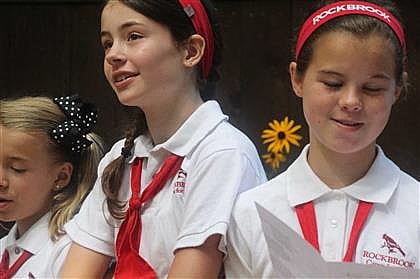On Sunday, the Juniors put on a beautiful Chapel for all of camp, on the theme “Integrity.” Though I shouldn’t have been, based on the campers that I have the pleasure of getting to know each summer, I was surprised by how firm a grasp many of these girls had on a concept that can best be described as, “You know it when you see it.”
Oftentimes, in thinking of integrity and in striving for it, I find myself mired in complexity. Integrity, after all, is composed of a hundred different qualities that are, in themselves often difficult to achieve. Honesty, industriousness, moral fortitude, and trustworthiness are all components—but which are the most important, and which can I fail to achieve from time to time without losing my integrity?
As I so often realize in my job, even the most daunting and complicated of topics can be made simple by the solid logic of a child. Integrity, as was expressed many times throughout Chapel, is achieved when you “do the right thing, even when no one is watching.”
One after another, campers explained that this is the standard that they set for themselves: not only to do the right thing, but also to do it for the right reasons. To clean up the dinner table for the cabin-mate who forgot, and keep it to themselves. To pick up the trash strewn around the over-full trashcan in the empty lodge. To take just one muffin during muffin break, even though the Hi Ups’ backs are turned and they could easily take two. To do all of this without asking for praise or recognition—to do it only because it is the right thing to do.
The Juniors were also quick to acknowledge that it is impossible to live up to these standards at all times. A significant part of integrity, to them, is falling short of these goals and owning up to it afterwards. The example that stuck with me was a camper who took a nice pen from the lost and found at school, then returned it a day later. Nobody would have known that the pen had been taken or who took it, but still she returned it so that it might still have the chance of being reclaimed by its owner.
I like to think that camp is the perfect environment in which to develop integrity. This kind of close community living helps campers to feel accountable to their peers and to the camp as a whole—they learn quickly that if they are not behaving well, then their actions will have repercussions that affect many others. Likewise, good deeds tend to be recognized and appreciated more often here than in the real world. Even if campers are not behaving well specifically for attention, that attention still might find them, and teach them one of the many rewards of integrity.
Sarah pointed out at the very end of chapel that, built into the routine of camp, is a daily reminder of all that having integrity entails. Every night before bed, campers of all ages recite the Rockbrook Prayer. Conceived ninety-four years ago as a Christian prayer, and changed in later years to reflect the disparate religious beliefs of our many campers, the prayer is essentially a challenge to every camper to be a better person tomorrow than she was today. In it is outlined the behaviors and qualities that give a person integrity, even though it doesn’t say so outright. Countless alumnae have told us that this prayer has stayed with them throughout their lives, and that various lines will come floating up out of their memories in moments when they need reminding of the sorts of women that Rockbrook has helped them to become.






0 Comments
Comment section